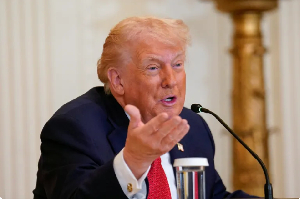The government is targeting the first week of September to launch the international initial public offer (IPO) of Agyapa Royalties Limited, the company formed to monetise Ghana’s future gold royalties by raising equity capital from investors.
The transaction, which received the approval of a divided Parliament on Friday, will raise at least US$500m to finance development projects.
Minority Members of Parliament staged a walkout during the debate on the transaction, describing it as “opaque” and leaving the majority side alone to ratify it.
The transaction has been structured based on the Minerals Income Investment Fund Act 2018, which established the Minerals Income Investment Fund to manage Ghana’s equity interests in mining companies.
The act empowers the fund to create and hold equity interests in special purpose vehicles (SPVs), which may operate as regular commercial companies in any jurisdiction; to assign the mineral equity interests, including the right to receive mineral royalty payments, to an SPV in furtherance of the fund’s objectives; and to procure the listing of an SPV on any reputable stock exchange.
In July, Parliament passed amendments to the act to facilitate the realisation of the transaction.
The transaction structure includes two special purpose vehicles, Agyapa Royalties Limited (Agyapa) and its subsidiary ARG Royalties Ghana Limited (ARG). The sole shareholder of Agyapa is the Minerals Income Investment Fund, which, through the MIIF Act, has been assigned rights to Ghana’s mineral royalties and equity interests in mining companies.
Under an investment agreement between Ghana, the Minerals Income Investment Fund, Agyapa and ARG, the fund has assigned its right to receive royalties to ARG, which, upon receipt, will transfer the revenue to Agyapa. In exchange, Agyapa will issue shares worth US$1bn to the fund. The planned IPO of Agyapa will offer some of the shares held by the fund to investors in order to raise the US$500m targeted.
“The value proposition for investors is that Agyapa is entitled to receive the allocated mineral royalties, which can then be distributed to its shareholders (including the fund) as dividends,” said a report by Parliament’s Finance Committee on the transaction.
The report added: “Gold prices have soared beyond the US$2,000/ounce mark, thus making investments in gold and gold-related vehicles very attractive to international investors. There is the need therefore to undertake this transaction in a timely manner so as to realise the most optimum amount from the transaction.”
In giving the green light to the deal, Parliament approved five agreements submitted by the Ministry of Finance to facilitate the process. These were the Minerals Royalties Investment Agreement (among the parties), the Amended and Restated Minerals Royalties Investment Agreement, the Relationship Agreement, the Assignment Agreement, and the Indemnity Agreement (which provides loss-protection to investment banking parties expected to be involved in the IPO).
Justifying the need for the transaction, Finance Minister Ken Ofori-Atta said in a memorandum to Parliament that, whereas Ghana conventionally raises funding for development from debt capital markets, the government “seeks to diversify its capital portfolio by obtaining long-term capital, without repayment obligations, through equity capital market transactions.”
He added that the deal will reduce Ghana’s budgetary exposure to mineral royalty revenues due to fluctuations in mineral prices and mine output. In 2019, Ghana’s income from mineral royalties stood at about US$200m, according to Finance Ministry figures.
Following the IPO, Agyapa will be listed on both the Ghana Stock Exchange and the London Stock Exchange.
Business News of Wednesday, 19 August 2020
Source: thebusiness24online.net













